When Shannon Gibson recruited athletes to join the women’s mountain bike team she was creating in 2010, she knew what she was looking for.
“I wanted to pick women who would support each other,” said Gibson. “I wanted people who could race and win and be kind about it.”
At the time, Gibson was a decade into her mountain bike racing career—and by career, it was a full-time passion. Her income, meanwhile, came from running her own therapy practice (for the Rolf Method of Structural Integration and Sensorimotor Psychotherapy) in El Paso, Texas, her hometown. “That’s been my gainful self-employment,” said Gibson, whose therapy practice is now a 30-year established business. “I would say the top five or six women in the pro mountain bike field have salaries, and everyone else has some sort of real job, maybe, or a part-time job. Women are great multitaskers.”
A former professional ballerina, who once danced in the Nutcracker at the Arie Crown Theater in Chicago, Gibson was following the advice of a personal trainer when she picked up mountain biking in 1999. It let her spend time outside with her husky puppy and get some exercise. She was good at it, saying that it felt similar to ballet in terms of focus, balance and cardiovascular exertion. “I was a jumper and a turner, so I had good ‘explosivity’ and good high heart-rate capacity,” said Gibson. In the late 1990s, she won her first races in the beginner’s league, then upgraded to expert, and in 2003, she started racing professionally.
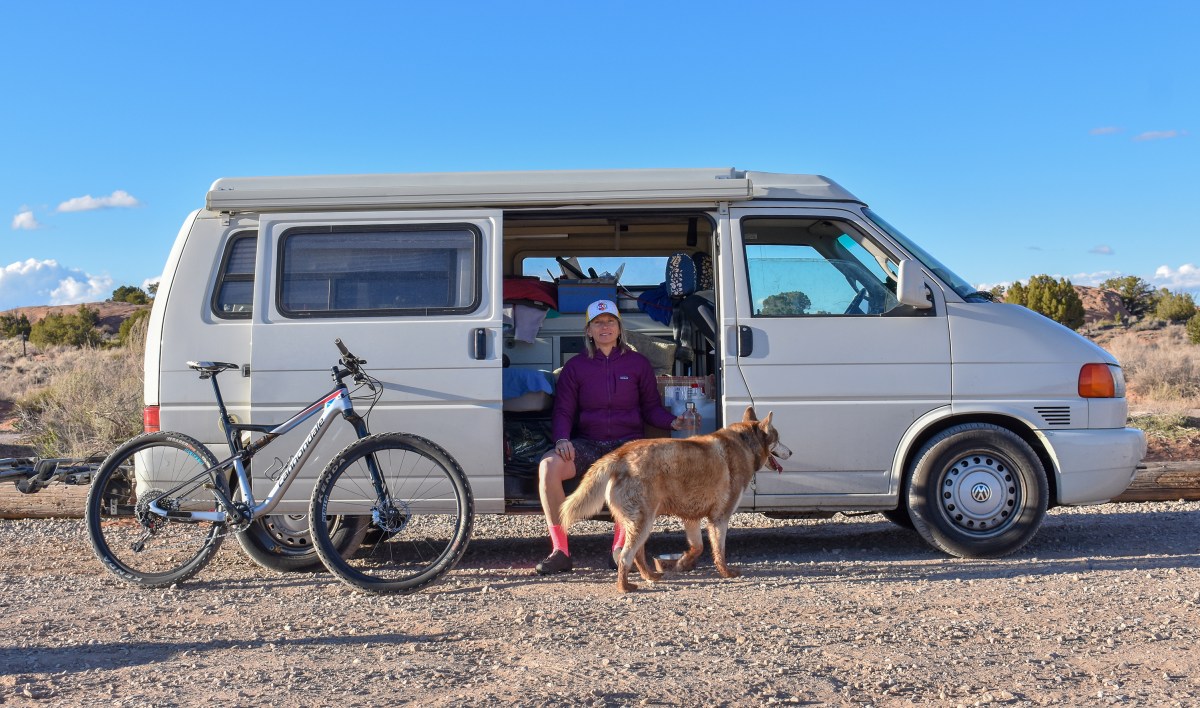
Shannon Gibson is the team’s founder and equipment liaison. Photo Credit: Geoffrey Williams/Courtesy of Cannondale Kenda Women’s Elite Team
The first woman Gibson tapped to join the team was Nina Baum, who she had met at an off-road race series in New Mexico. Baum was also a good multitasker, balancing cross-country and short-track mountain bike racing with a full-time job. Midweek, she was working in organic materials research and development at the Sandia National Laboratories in Albuquerque, New Mexico, where she was experimenting with carbon fiber for aerospace applications, among other things. Through racing, Baum was breaking out on the cyclocross and 24-hour solo mountain bike race scenes and winning national championships.
The two became friends and race buddies, seeing each other at regional races and sometimes traveling together. Baum had been sponsored for Cannondale since 2005 and was on the company’s national team, but Gibson was a “privateer,” as she calls it. Gibson had a list of sponsors, yet she organized all her own logistics and travel for racing. When the opportunity came from Stan’s NoTubes to start a women’s mountain bike team, Gibson took it. The team launched in 2011, and a couple of years later, Baum connected the team to a sponsorship with Cannondale.
“Many cycling teams in mountain biking consist of one or two riders and the village who supports their endeavor,” said Gibson. “I really see a ‘team’ as a group of people gathered under a dedicated collaborative for the achievement of a common purpose. That purpose can be to win races, or to provide marketing exposure or to set an example of sport as service to one’s community.”
The Cannondale Kenda Women’s Elite Team does not pay its athletes a salary, but it does provide them with gear and it helps with race fees and logistics to travel to races. Importantly, it also acts as a vehicle for the athletes to become advocates for women in cycling. They host clinics and team rides. They are also integral in providing Cannondale with real feedback about the company’s women’s products.
“The team became known as being supportive of women,” said Gibson. “If you have all the things being equal of talent and hard work and motivation, sometimes what puts you over the edge is that extra feeling of being supported and being calm and knowing that you have it all together on race day.”
This season marks the team’s ninth, and many of the original racers are still involved. The athletes on the team represent a diverse mix of strengths and compete in Xterra cross-triathlon and long-distance, endurance mountain bike races.
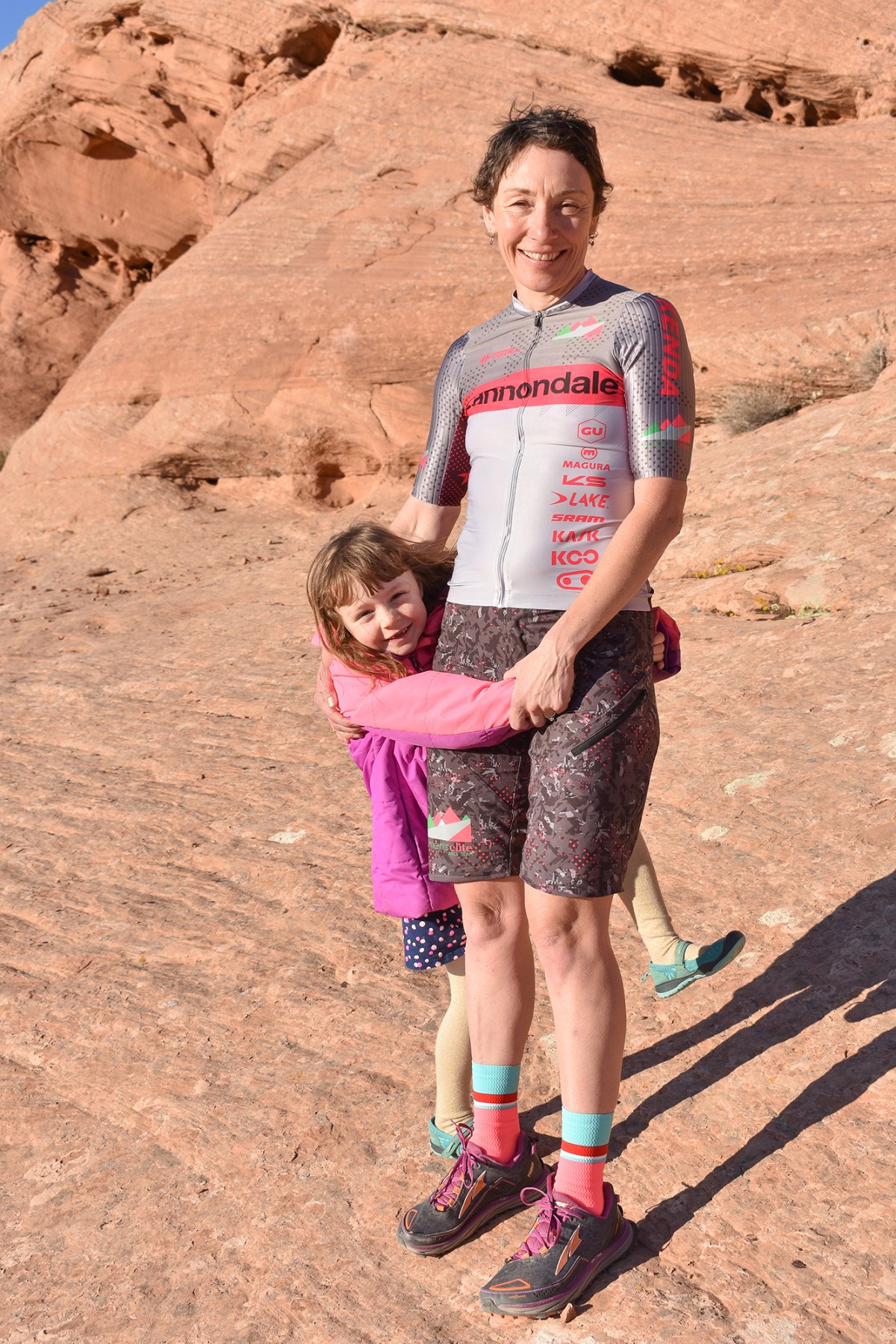
Professional mountain bike racer Jennifer Smith is the team’s manager and leader. Her daughter, Jade, is 5. Photo Credit: Geoffrey Williams/Courtesy of Cannondale Kenda Women’s Elite Team
Jennifer Smith, a professional mountain bike racer from Gunnison, Colorado, joined the team in 2012 and is the current team manager and leader. She’s represented New Zealand—her home country—in three sports at world championship events: track and field, Xterra triathlon, and Olympic-distance mountain biking. At the Xterra World Championships, she has placed 4th and 6th. She has five top fives in the Leadville Trail 100 MTB, placing as high as 2nd. When not competing, Smith is a coach, training cyclists, triathletes and high school students.
Smith is also a mom, raising her 5-year-old daughter, Jade. At a stage race in Moab, earlier this spring, Smith brought Jade along and hired a babysitter while she competed. It’s not especially common for athletes to bring their babies to races, she noted. “But I think that’s changing.”
“I was given advice years ago, that to be successful in this sport, you want to integrate it into your long-term lifestyle,” said Smith, who is riding the Cannondale Scalpel si, Fsi, and Super X Women’s Force 1. “I took that advice to heart, along with the idea that I do my sport because it provides a lens to evolve as an athlete and human.”
Vicki Barclay is an endurance and cross-country mountain bike racer, who specializes in stage and 100-mile events. She completed her PhD in infectious disease biology when she was 26, which was more than a decade ago. And now, when she’s not training on her bike or racing in the 15 to 20 events she signs up for every year, she works as a senior program manager in gene therapy for a biotech company in Philadelphia.
“I think that to be able to train and race while working full-time requires a certain mindset and a level of sacrifice,” said Barclay. “You have to love structure and also [have] the mental strength to settle into the fact that training is very repetitive, and sometimes feels mundane. But if you stick with it, and keep showing up, you’ll see results.”
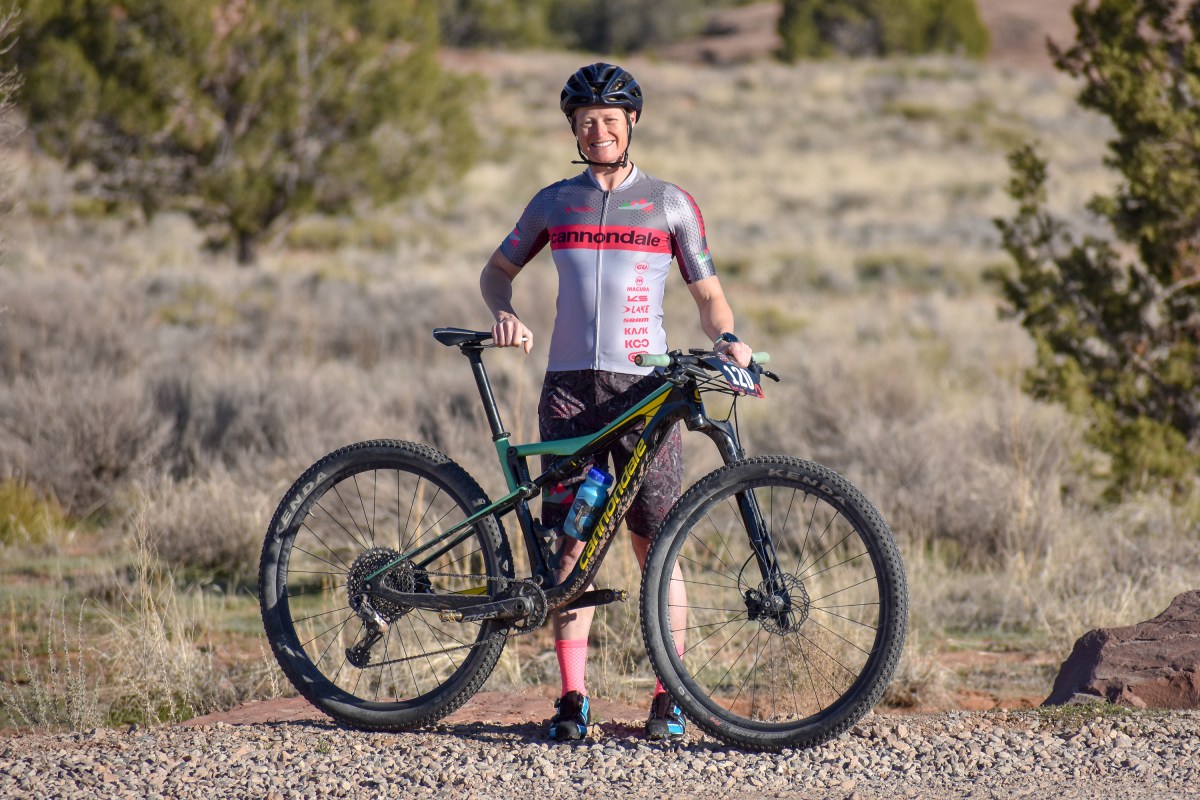
Suzie Snyder is the Xterra USA Champion. Photo Credit: Geoffrey Williams/Courtesy of Cannondale Kenda Women’s Elite Team
Based in Reno, Nevada, Suzie Snyder is the team’s new recruit, joining this year as she defends her 2018 title as Xterra USA Champion. Snyder grew up on a lake and says she was always a swimmer. She was originally competitive in running, phasing into triathlons. She started racing Xterra in 2003, which prompted her to pick up mountain biking. “I had to teach myself how to ride and just eventually got good enough at all three events to get my pro card,” said Snyder, who has been competing professionally since 2010. “I just love the sport, and I love that Xterra is mountain biking and trail running, rather than road.” Like her teammates, Snyder subsidizes her racing with a job. She uses her own experience as an athlete to help others as a endurance sports and strength and conditioning coach. Being able to connect with other athletes, and especially women, was one of her main reasons for joining the Cannondale Kenda Elite Team.
“As far as outreach goes, it gives you a greater sense of satisfaction that you’re doing something good for the community,” said Snyder. “Racing can be such an individual sport, that it feels selfish sometimes.”
As the team’s equipment liaison, Gibson is still integral to the team’s operations, even though she has largely retired from racing. At the beginning, Gibson remembers building “frankenbikes” for each of the racers because there weren’t the range of sizes in bikes to fit all the women on the team. Now, there’s a bike in Cannondale’s women’s product line to fit every woman. “That’s a direct result of the team,” said Gibson.
Four years ago, Baum left New Mexico’s laboratories to work at Cannondale’s headquarters in Wilton, Connecticut, as the women’s product manager.
“We had so many insights and observations from racing our bikes and riding our bikes and thinking about bikes all day long,” said Baum. “Knowing that some of that is going into future bikes, that’s a really cool, motivating feeling.”
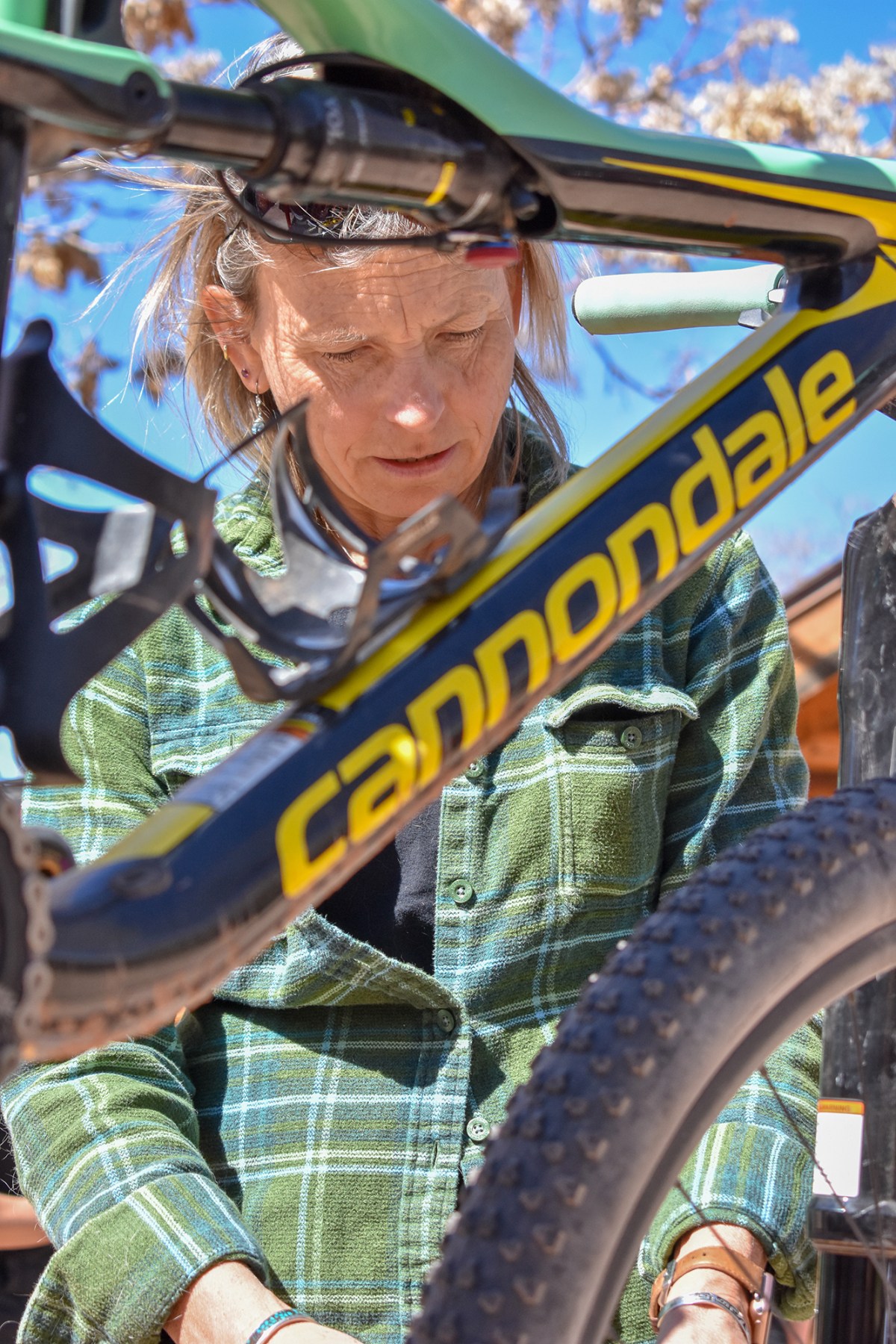
The team provides feedback to Cannondale that helps steer women’s bike development. Photo Credit: Geoffrey Williams/Courtesy of Cannondale Kenda Women’s Elite Team
Baum kept racing for her first year in the job, but an autoimmune disease that deteriorated the proximal extensor muscles in her legs, including her quadriceps, and prevented her from competing on the bike. Still, Baum has stayed involved with the team, helping them organize and host outreach events and women’s bike clinics (they were at several REI Outessa clinics in recent years). As well, Baum has established an important and unique relationship between Cannondale’s women’s bike development efforts and the team.
The relationship goes two ways. Cannondale provides the team with updated models of the bikes. At the same time, the athletes have a direct connection to Baum and they provide feedback about the bikes—telling Baum that, perhaps, a lower front end would be better for their bike fit, or giving insight into how wheel size affects fit and handling, depending on the bike’s and rider’s sizes. That kind of information is valuable, and gets incorporated with other data Cannondale collects to inform the design and specs of the bikes. Dedicated, specific information from a single rider can sometimes be more interesting and valuable than an average calculated from many different users, said Baum.
“It’s nice to have that direct link,” said Baum. “There are often teams racing for a bike company and they don’t have the same interaction. I feel like it’s much more two-way, since I am the women’s product manager here and I am so tightly involved with them.”
Gibson, for example, rides the Cannondale Scalpel. Even though she’s not racing as much, she’s influential in her community (Gibson lives in Durango), according to Baum. “The feedback that I get from her now goes into the pipe for things that we’re doing two or three years in the future.”
With race bikes, there’s a lot of nuance to rider position and how it relates to wheel size, suspension tune and travel, along with other aspects of the bike’s build, said Baum. “I can tell them what the physics are,” she said. “Coming from the middle ground, and understanding what those compromises are from the riders’ standpoint are things that we don’t always see from the bike development side of things. That’s a super helpful data point that I’m able to get from being in close contact with the team.”
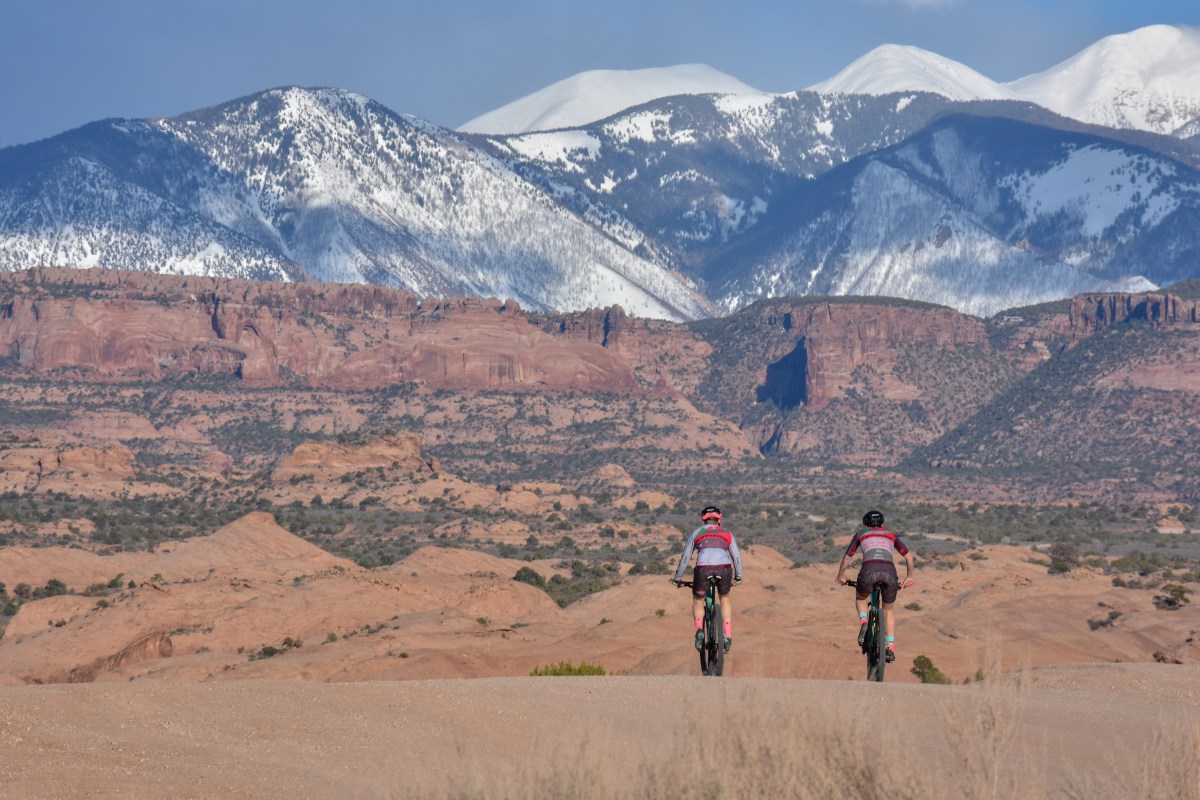
Photo Credit: Geoffrey Williams/Courtesy of Cannondale Kenda Women’s Elite Team
Immediately before Baum started working at Cannondale, women’s bike development fell largely to the teams that were working on umbrella categories, like road or mountain. (The women’s product manager role had been vacant for two years.) Baum recalls a long-standing assumption in the bike industry that women tended to have a shorter torso and longer legs than men of the same height. She opposed that thinking, saying that she saw variability in body geometry among women mountain and road racers, and people in general. “This never seemed right to me,” said Baum. The difference is more in the range of sizes. One of the accomplishments at Cannondale that she is most proud of is making the entire product line at Cannondale a much better fit for small riders, and specifically making extra-small-sized mountain, road and gravel bikes that fit women who are as short as 4-feet, 11-inches tall.
“Being able to make bikes that are perfect for that part of the population is really cool to me,” said Baum.
She also believes it’s important to create space for women by creating products that are built with women in mind. “Your product is sending a message about whether you want women to be a part of your group or not. And so that is the most important thing to me, making sure all of our bikes have really good specs for smaller, female people,” said Baum. “It’s the feeling that something was made with you in mind, and it’s something that you will gravitate toward. From that standpoint, we have a lineup of women’s bikes that I’m really proud of.”
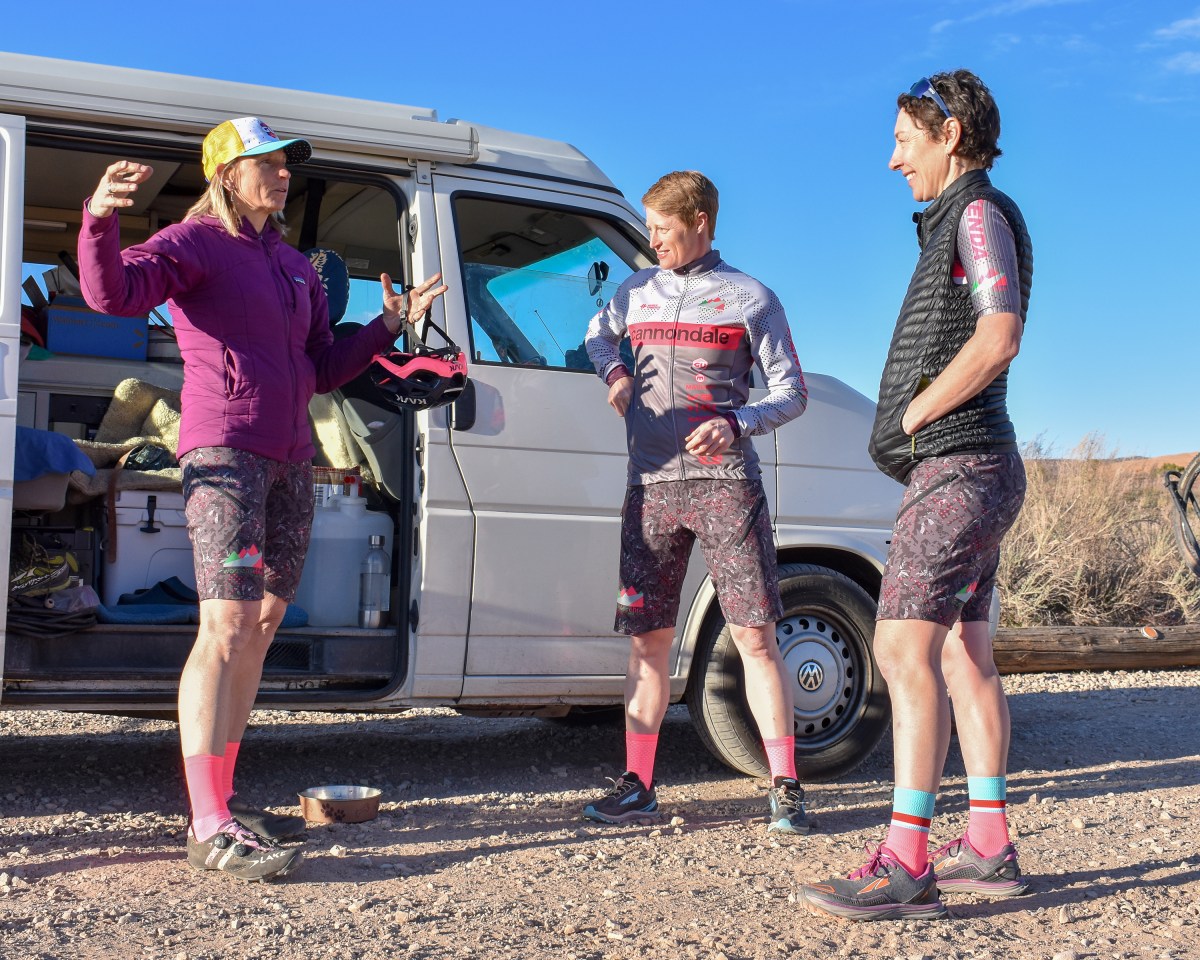
Photo Credit: Geoffrey Williams/Courtesy of Cannondale Kenda Women’s Elite Team
For Baum, the coolest part of the team is how strong and independent each of the women are.
“Cycling is a very important thing for them. Racing is very important. But they have lives. They have kids. They have jobs,” said Baum.
Baum also loves the opportunities she and her teammates have to connect with other people at events. The team has a social media presence, but the greater value and service they provide is hands-on outreach. This year, their ride and clinic schedule will take them all over the country, from Epic Rides to weekly events in their hometowns with local clubs and high school teams.
“If you talk to a woman and give her a little tip on how to work her way up a rock ledge that she’s struggling with, you have a very intimate and positive connection with that person. When you get that solid, personal connection, it’s a lot more impactful,” said Baum. “You’re actually making them a better rider in that moment and that’s going to help them spread the love of riding in that moment.”
Editor’s Note: This story was produced in partnership with Cannondale and REI.
